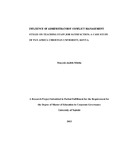| dc.description.abstract | The purpose of the study was to investigate the different conflict management styles employed by the administrators‟ and their influence on the teachers‟ job satisfaction at Pan Africa Christian University, Kenya. Research objectives were formulated to help determine the influence of administrators‟ use of competitive conflict management style on teachers‟ job satisfaction, establish the influence of administrator‟s use of collaborative style on teachers‟ job satisfaction, determine the influence of administrators accommodative conflict style on teachers‟ job satisfaction, determine the influence of administrators‟ avoidance conflict style on teachers‟ job satisfaction, establish the extent to which compromise as a conflict management style influences lecturers job satisfaction in Pan Africa Christian University. The study employed descriptive survey design. The target population was 10 administrators‟ and 180 lecturers‟ in Pan Africa Christian University. The sample comprised all the administrators and lecturers. Stratified sampling was used in all the departments and 10 percent was picked from the population. Data were collected by use of questionnaires and was analysed by use of qualitative and quantitative techniques. Results were presented in frequency tables and a computer software (SPSS) was used to analyze the data of the main study.Data was presented in descriptive statistics and results presented in form of frequencies and percentages. Different administrators used different styles for example; administrators who used competing style influenced lectures‟ job satisfaction with 10 percent. While administrators who used accommodative style to influence lecturers‟ job satisfaction were 30 percent. In addition, administrators who used compromise conflict management style to influence lecturers‟ job satisfaction were 20 percent. Findings revealed that administrators and lecturers understood the different conflict management styles, use and significance in relation to job satisfaction. Administrators used collaborative, accommodative and compromise styles in satisfying teachers‟ job hence productivity. Findings further revealed that administrators use of competitive conflict management style and the lecturers‟ enjoyed their work and became active. The study further revealed that administrators use of accommodative conflict style influenced lecturers‟ job satisfaction. The administrators‟ preferred this conflict management style because it is highly co-operative. Findings also revealed that administrators‟ who used avoidance conflict management style to influence lecturers job satisfaction were 10 percent and those who used collaborative conflict management styles was 33 percent. This showed that lecturers were very satisfied when administrators used collaborative style. The level of teaching staff job satisfaction on compromise style was 5.56 percent thus showing that they were unsatisfied. In accommodative style, the level of teaching staff job satisfaction was 27.78 percent thus satisfaction. The results show that administrators cooperated 50 percent and allowed the teaching staff to achieve their goals and outcomes thus reducing competition. The study concluded that administrators and lecturers understood the different conflict management styles and their significance in relation to job
satisfaction. 30 percent indicated that administrators used accommodative, 10 percent used competitive and 30 percent collaborative conflict management styles positively that is the administrators looked at the concerns of the teachers‟ to satisfy them. 10 percent of the administrators used avoidance conflict style which influenced the lecturers‟ job satisfaction negatively. The study concluded that conflict management styles were commonly used by the administrators to influence lecturers‟ job satisfaction. Avoidance conflict management was the least used by the administrators. The study recommended that there is need to advice administrators‟ in the university to make use of the three conflict management styles in handling conflicts in different situations to satisfy lecturers. Administrators should use these styles to improve lecturers‟ job satisfaction and strengthen their relationship thus improve performance in the organization. The administrators also should understand that gender, working experience, and academic qualification are connected with different conflict management styles. Good choice of conflict management style by the administrators‟ will improve work and build strong relationship within the university. There is need to make a choice of good conflict management style irrespective of the demographic, working experience, and gender. The study suggested that this study to be replicated in a public university or any other educational institution. There is need to replicate this study the same study in a public university in order to find out if the same claims are appropriate regarding administrators‟ conflict management styles. A study should be carried out on the effect of administrators‟ conflict management styles on teaching staff performance. There is need to investigate if there are other variables strongly related to administrators conflict management styles on lecturer‟ job satisfaction. | en |

